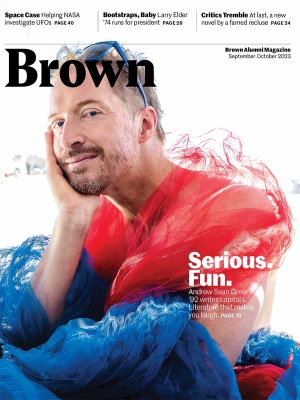Eli Wolff ’00 and Jonathan Mooney ’00 were both still at Brown when, says Mooney, Wolff blew his mind for the first—but far from the last—time. Mooney, who now writes books on disability and neurodivergence, was telling Wolff about growing up with dyslexia and not learning to read until he was 12. Wolff himself could relate—he’d been left partially paralyzed at age two by a stroke he’d had after surgery to address having been born with a hole between his heart’s upper chambers.
But then Wolff pushed Mooney further. “One of the first things he said to me,” recalls Mooney, “was, ‘Disability is partly a social construct.’ Whoa, dude, what do you mean? I thought it was a problem in somebody’s mind or body. But he took the example of my dyslexia and said, ‘Okay, let’s imagine that you had to write down this conversation we just had.’ I said, ‘That would be a shitshow—I spell at a third-grade level.’ He said, ‘So if you had to write it out, you’re impaired, but if you talked it out, you’re not.’ It was a really astute observation about how disability is about the interaction between embodied difference and context. That was a really profound realization.”
Wolff, who died April 4 at age 45 of cardiac arrest, devoted his life to helping individuals and organizations have profound realizations about disability—especially in the realm of sports—and then to make changes that created more equity and inclusion. What he accomplished in his too-soon-ended life is extraordinary: He not only competed internationally in Paralympics soccer in 1996 and 2004, but in 2001 he was presented with the Casey Martin Award for the fruits of his advocacy—which included organizing a coalition of groups to support Martin, a pro golfer born with a defect in his right leg who successfully sued the PGA Tour, under the Americans With Disabilities Act, for the right to use a golf cart during competitions.
But that was hardly all. He was a pioneering member of the Men’s National CP soccer team, for those who’ve experienced cerebral palsy, stroke, or traumatic brain injury. Shortly after graduating from Brown, he worked with the United Nations on an international treaty on the rights of persons with disabilities—and on establishing the International Day of Sport for Development and Peace, every April 6. He also held jobs managing research and advocacy at the Center for Sport in Society at Northeastern University and codirecting the Royce Sport and Society Fellowship at Brown University, and most recently he was a sports management instructor at the University of Connecticut.
“He was relentless toward his goals and passion for how sports could promote human rights, but was never obtrusive about it,” said his wife, Dr. Cheri Blauwet, who survives him in Wellesley, Mass., along with their two young children, Stella and Spencer, and his parents and siblings. “He was a gentle giant who constantly applied pressure to whatever he was working on but was very congenial and kind, and an incredible mentor.”
Blauwet said, laughingly, that each year as the International Day of Sport for Development and Peace approached, Wolff “worked on it 24/7 and went into his anxious zone and wouldn’t sleep—until I told him that he needed to recruit some help on it.”
Dr. Theodore Fay, who founded with Wolff the Power of Sport Lab and Disability in Sport International—platforms that push for greater inclusion of those with disabilities in athletics—said that one of Wolff’s key accomplishments was, in the early 2000s, getting the ESPY Awards (“the Oscars of sport,” says Fay) to create categories of best male and female athlete with a disability.
“Eli was masterful in bringing people together,” said Fay, “and it wasn’t for the aggrandizement of Eli Wolff, but for the work of inclusion and equity. He felt strongly that people with disabilities were people first who should be respected and included, not pitied. He was a quiet warrior with a disarming smile and an absolutely dogged commitment to his causes.”
Wolff was also instrumental in helping draft the U.S. Office of Civil Rights “Dear Colleague” letter of 2013 that amended requirements for equity and inclusion for students with disabilities in school-based athletics. “Eli basically got them to change the directive from ‘should include’ to ‘must include,’” explained Fay. Additionally, he got Major League Baseball to rename its “Disabled List” the “Injured List” in 2019. Said Fay: “He took that right up to the MLB commissioner and it took 15 years, but he never gave up.”
Wolff was born in Los Angeles and went to Milton Academy outside Boston for high school. At Brown, he studied sociology and was the recipient of a Swearer Center Royce Fellowship, for which he researched the scope and effectiveness of U.S. sports organizations for those with disabilities. He stayed connected and became cochair of a steering committee that is currently working to establish a disability and neurodiversity affinity community for Brown alumni—just one of the many ways he gave back, says Zack Langway ’09, Brown’s vice president for alumni relations. Wolff also earned a master’s in Olympic studies from the German Sport University in Cologne. He met Blauwet, who has also competed in the Paralympics, via their sport inclusion advocacy in the early 2000s. The two stayed in touch as friends until Blauwet moved to Boston in 2009 for her residency, whereupon they began dating. They were married in 2013.
Blauwet says she hopes Wolff’s legacy will be “inspiring the next generation of young leaders” in the realm of sport inclusion. “Working and mentoring students really energized him.” She also asked that his parenting be mentioned. “He was a really dedicated father.” In fact, he was “well-known in the neighborhood as being that present father,” she told the Boston Globe, “which, for me as a working mom, was incredibly valuable and gave me peace of mind, and allowed me to follow my dreams—which I never took for granted.”
At a TEDx Talk Wolff gave at Amherst College in 2014, he talked about taking a Brown class, “Sports in American Society,” and being dismayed to find that race, gender, and sexual orientation were addressed in the key textbook—but not ability or disability. At that moment, he said in the talk, “I knew that I wanted to make a difference and fill that book with that chapter on ability.”
In the talk, he went on to envision a world where athletes with disabilities were not segregated onto their own teams and competitions but were mixed with other athletes in versions of sport—such as wheelchair basketball, sitting volleyball, or blind soccer—that could be played by those with or without disabilities.
“Think about the glasses you wear,” he concluded the talk, visibly emotional. “Are they the glasses of inclusion or exclusion? This means a lot to me. How, in every moment, do we make people feel included and valued? Thank you.”
Tim Murphy ’91 is a freelance journalist and author of the novels Christodora, Correspondents, and the forthcoming Speech Team.





